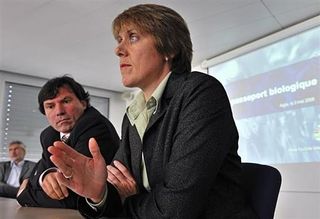853 riders subjected to UCI passport controls
UCI performed over 10,000 passport tests in 2009

The UCI carried out 10,603 tests on the 853 riders in the biological passport in 2009 it was confirmed today, an increase from the 8,404 tests carried out on 839 riders in 2008. The statistics were provided by Anne Gripper, the head of the International Cycling Union's (UCI) Anti-Doping Department.
The news came on the back of the Rabobank team's announcement of how many blood and urine test their riders had undergone in 2009 at the hands of the UCI.
"Volume of testing doesn't prove a lot except that it's some kind of assurance that riders are well tested," Gripper told Cyclingnews.
"This kind of announcement isn't a totally a new concept either, but what I do know is that the Rabobank riders were really pushing for this. They want people to know that they're well tested."
In previous years both Astana and CSC released the number of tests carried out by their own internal testing programmes, while riders like Bradley Wiggins, Lance Armstrong and Christian Vande Velde have all released their actual test results in a bid to prove that they are racing clean.
While this goes some way to prove transparency, Gripper feels that it can lead to riders being openly and unfairly criticised in public. Last year Armstrong removed his test results relating to the Tour de France after they were questioned.
"I don't think there's anything bad with them doing it. The problem with releasing results is that every single amateur arm-chair haematologist and physiologist starts getting involved and making comments. There's a lot of information behind the released parameters that influence, like altitude training, hydration and physiological characteristics so it kind of opens them up for unfair attacks from all these armchair people who sit around and think they know how to interpret these results."
Get The Leadout Newsletter
The latest race content, interviews, features, reviews and expert buying guides, direct to your inbox!
While the Rabobank announcement can be seen as a goodwill gesture, it does illustrate the discrepancies between riders tested throughout the year. For example, Dennis Menchov had 21 blood tests and 21 urine tests while others riders on the team faced less ten tests. This could be due to a number of factors. Firstly if a rider is part of targeted testing programme; if he wins a number of races and finally if the UCI have information from blood profiles or other sources which means that they could possibly be at risk of doping.
"We do our best to get the tests as evenly spread as possible. We have a base level and then some riders have more. We're at the point right now where we can be much more precise over which riders we test and at which times. It's more precise than it was and keeping track of 850 riders and their tests can be a little bit tricky."
"For some riders that have been in the passport for two years we're dropping their testing right down to six or seven blood tests a year because they already have a substantial profile which appears normal, so that means that those riders have less routine tests conducted on them."
In addition to targeting riders who may be more at risk of doping, in 2009 the UCI ran it's first event-specific focussed out-of-competition testing programme in the run up to the Tour de France, conducting high volume testing on fifty riders who were aiming for various elements in the race, such as stages and jerseys. While that's the only really event-specific concentrated programme the UCI has run, Gripper added that the sport's governing body were using elements of the media to also help target riders.
"We always look at what a rider's intentions are and if a rider comes out and says this is my big race of the year then we'll make sure we test him pretty well before. We take a fair bit of interest in media reports and what riders themselves say and of course we have the whereabouts information to check what races they're planning to do and where they're going to train.
Daniel Benson was the Editor in Chief at Cyclingnews.com between 2008 and 2022. Based in the UK, he joined the Cyclingnews team in 2008 as the site's first UK-based Managing Editor. In that time, he reported on over a dozen editions of the Tour de France, several World Championships, the Tour Down Under, Spring Classics, and the London 2012 Olympic Games. With the help of the excellent editorial team, he ran the coverage on Cyclingnews and has interviewed leading figures in the sport including UCI Presidents and Tour de France winners.
Most Popular

